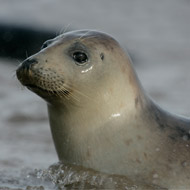
Conservationists launch latest audit of marine mammal populations
Conservationists participating in the fourth annual seal survey of the Thames Estuary have described the study as 'the most important yet'.
Scouring air, land and sea this week, experts from ZSL will be counting the latest numbers of grey and harbour seals. They will also be on the lookout for any emerging health trends.
The team hope their findings will help to inform future management and conservation efforts in the region.
Over the last 15 years, grey seal numbers have rapidly increased - particularly on the South coast of England. But conservationists are worried this has led to greater competition between grey and harbour seals - both for food and places to leave the water.
Commenting on the survey, ZSL's European projects manager Joanna Barker said that from a conservation point of view, this survey is one of the most important yet.
“New behaviour of grey seals predating upon harbour seals has recently been observed in other European seal colonies," she explains. "As the large intertidal sandbanks in the Thames are preferred harbour seal habitat, we are interested to see what impact increased competition could have for the species."
Due to the close proximity to mainland Europe, the team are also concerned that the Thames may serve as an entry point for disease outbreaks affecting seals.
"We are particularly mindful that the last outbreak of phocine distemper virus happened 14 years ago in 2002, and if a similar pattern is observed it is predicted to return in 2016," said Joanna.
"Combine these various threats and you have what could amount to a ‘perfect storm’ for the Thames’ harbour seal population, which makes ZSL’s 2016 survey arguably the most important one yet.”
Last year's survey found 451 harbour seals and 454 grey seals in the Thames Estuary. Data collected from this year's research will reveal any change in abundance of harbour seals and also highlight the ratio of harbour seals to the more dominant grey seals.



 The Veterinary Medicines Directorate (VMD) is inviting applications from veterinary students to attend a one-week extramural studies (EMS) placement in July 2026.
The Veterinary Medicines Directorate (VMD) is inviting applications from veterinary students to attend a one-week extramural studies (EMS) placement in July 2026.